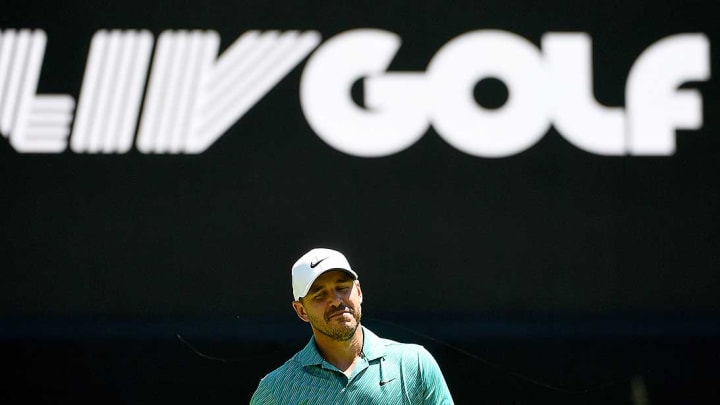The PGA Tour Secured an Early Win Over LIV Golf in Court, But Much Remains to Be Decided

The headlines from the San Jose, California, courtroom where Judge Beth Labson Freeman ruled against the plaintiffs, Talor Gooch, Hudson Swafford, and Australian Matt Jones—"Judge does not grant a temporary restraining order"—are accurate, but at the same time misleading.
Misleading because the ruling is just one of many that will occur in a case that still has much life in it. This instance affected only three PGA Tour events that make up the FedEx Cup Playoffs.
At the 11th hour, the plaintiffs amended their complaint to have the TRO motion extend only to the 2022 playoff events and not all PGA Tour events as the original motion asked for, which ultimately was the right move.
“I will comment that I did receive the plaintiff’s revised proposed order,” Judge Freeman stated at the beginning of the hearing. “And Mr. Walters (plaintiffs' attorney), thank you for that, I think that that is a more realistic approach to the temporary restraining order, and frankly, consistent really with your briefing, and so that’s greatly appreciated.”
This means that none of the LIV Golf players still retaining membership on the PGA Tour will be able to play on the Tour until after the preliminary injunction hearing takes place and Judge Freeman rules on that motion. Since that hearing does not have the same emergency aspect to it, the decision from that hearing will likely come later in the year or in 2023.
After she made the ruling on the TRO, Judge Freeman outlined her proposed schedule for the case, with an evidentiary hearing tied to a motion for a preliminary injunction likely at the end of September or beginning of October, motions for summary judgment in March of 2023, and eventually a trial in August of 2023.
In between, numerous motions and rulings will come that will steer this case into trial.
So, while the PGA Tour won the first go-round, to use a golf analogy, making a birdie on the first hole doesn’t mean you’re going to win the tournament. There are a lot of holes yet to play.
Where the TRO Missed the Mark
For Gooch, Swafford, and Jones to prevail in the hearing for a temporary restraining order (TRO), they needed to prove all four of the criteria set out in the law:
1) That they have a substantial likelihood of success on the merits; 2) that they will be irreparably injured without relief; 3) that the threatened injury outweighs the harm a TRO would inflict on the Tour; and 4) that the TRO would serve the public interest.
Ultimately, Judge Freeman felt the plaintiffs fell short of the burden of proving the irreparable harm provision and was clear that she was concerned with that plaintiffs' argument in her opening remarks.
“I am first and foremost looking at the issues of whether you have established harm and the exigency that would be required for a temporary restraining order,” Judge Freeman said before either side had a chance for argument. “I have concerns that the plaintiffs have not made out their case for irreparable harm. This is not a case where the plaintiffs, the three bringing the TRO, would be restricted and unable to play golf. They certainly have the opportunity with LIV and have availed themselves of this opportunity.”
The judge could never get past this issue of harm, which ultimately made the other issues moot since the plaintiffs had the burden to prove all four criteria to receive relief.
It’s possible that LIV’s lead council, Rob Walters, if more knowledgeable about professional golf, could have made a more compelling argument on harm, but that did not happen in the two-hour hearing.
Walters clearly did not adequately explain that the plaintiffs had limited avenues to play in major championships and that harm was real and unforeseen.
The simplest way to qualify for a major is to be a past champion, as the PGA Championship, the British Open and Masters allow former champions to play until at least age 60. The USGA awards a 10-year exemption to U.S. Open champions following their win.
Certainly a high bar, but winning a major is one of the vehicles to get into more majors.
Second, players can finish in the top 30 in the FedEx Cup. Under current rules set by the majors, such a finish would give them an exemption into three of the following year’s four majors (except the PGA). The TRO would have provided the three plaintiffs such an opportunity to compete for that top 30.
Third, players can qualify for the majors if they are in the top 50 in the Official World Golf Rankings at certain times of the year but since these players are suspended from playing on the PGA Tour, they don’t have access to earn ranking points on the Tour, thus, most likely can’t qualify via that system.
Lastly, they can win a PGA Tour event as that will get them into the Masters, but again since they are suspended from the PGA Tour, that option doesn't exist.
Walters didn’t discuss the Ryder Cup implications and how U.S. players only get Ryder Cup points if they play in PGA Tour-sanctioned events.
The Olympics are also tied to world rankings and, again, the plaintiffs are prohibited from gaining any points toward the 2024 Olympics in Paris.
Unfortunately for the plaintiffs, their attorney either didn’t know or was incapable of addressing these issues with a cogent argument.
Instead, he cited the "Arnold Palmer Invitational in Ohio" during his arguments.
And he also made a significant blunder in misstating how the LIV player contracts work.
Judge Freeman: Well, but the LIV model is to pay all players to play and then give to awards to those who actually win or place.
Walters: That's correct.
Judge Freeman: So, the $4.3 million you cite isn't actually the comparative number.
Walters: Well, the guaranteed number is $160,000, which is admittedly a lot of money.
Judge Freeman: Well, these contracts provide for payments simply for showing up for the first tournament.
Walters: Well, they do, but then they have to win money in order to recoup against the contract. So, they are all a little bit different.
LIV was clearly out-lawyered on Tuesday in San Jose, but again it’s just the early stages of a complicated issue.
Three Takeaways for the Case's Future
1. Judge Freeman stated that LIV had made an appealing argument on the antitrust violations, but the PGA Tour had identified and pinpointed some key weaknesses in that evidence. The court will delve more into this at the preliminary injunction hearing.
2. LIV will need to make a better case for the Tour’s monopolistic actions. Judge Freeman used the affidavit in support of LIV’s case (by Jeffrey Leitzinger, Managing Director of Econ ONE Research, Inc.) against LIV in stating that LIV will have a 20 percent market share in the next year.
3. Judge Freeman stated she had great concern about the reach of the strong-arming by the PGA Tour to suppliers of its tournaments, down to tech suppliers, vendors, agents and clothing manufacturers.
The next item to watch will be if each side accepts Judge Freeman’s expedited schedule, which puts the trial date at August 2023. If either side declines, Judge Freeman said she doesn’t have any room on her docket until 2025.
Reader feedback is welcome at inbox@morningread.com and we may publish your letter (include your name and hometown). Click here to receive all the latest Morning Read news and commentary free in your inbox every morning.
